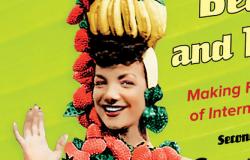Re-Investigating the Politics of the Everyday: A Return to Cynthia Enloe’s Bananas, Beaches, and Bases

Daniel Clausen asks what makes the classic text so good and how can it help us today?
Why revisit the classics of International Relations? Returning to essential books helps us to rethink our basic assumptions, inculcate the processes of good research, and reinvigorate the core values that motivate the discipline.
Cynthia Enloe’s seminal work, Bananas, Beaches, and Bases: Making Feminist Sense of International Politics, was a book I was introduced to as a graduate student. First published in 1989, with the second edition published in 2014, Enloe’s book is a thought-provoking and influential examination of the gender dynamics that permeate seemingly mundane aspects of life. The book delves into the lives of women whose experiences are often overlooked or dismissed as irrelevant to global affairs. The book encourages readers to see aspects of everyday life as inherently political. By examining issues such as tourism, bananas, military bases, and domestic workers through the prism of the question “Where are the women?” the author challenges us to see the world through a gendered lens.
 Like many rushed graduate students in International Relations, I read the book selectively and less thoroughly than I would have liked. This time around, I read the book not as a hurried young graduate student, but rather, slowly, as an exercise in mindfulness, thoughtful reading, and to train myself as a researcher. I did as Enloe suggests in her introduction: I read with an eye for gender and constantly checked the endnotes to see exactly how her case studies were constructed. As I read, I also tried to take her way of seeing the world with me. I asked in my daily life, as I read, in what ways are various aspects of my life “gendered”? And, just as importantly, where are the women?
Like many rushed graduate students in International Relations, I read the book selectively and less thoroughly than I would have liked. This time around, I read the book not as a hurried young graduate student, but rather, slowly, as an exercise in mindfulness, thoughtful reading, and to train myself as a researcher. I did as Enloe suggests in her introduction: I read with an eye for gender and constantly checked the endnotes to see exactly how her case studies were constructed. As I read, I also tried to take her way of seeing the world with me. I asked in my daily life, as I read, in what ways are various aspects of my life “gendered”? And, just as importantly, where are the women?
Instrumentally, and somewhat selfishly, I also used the book to help answer questions that have been preoccupying me.
- In what way does the book serve as an example of “good research,” and how can modern researchers, across disciplines, draw from the strengths of the book?
- How can the book encourage scholars and even undergraduate students to be more natural researchers and keen observers of everyday politics?
A Model of Good Research
I have always suspected that social scientists could conduct better research if given the investigative liberties of reporters (see my previous short article for Global Policy). It always seemed silly to me that I should have to go through an Institutional Review Board just to ask questions. It seems just as foolish that I am supposed to know what the important questions are before entering the field. The research before theory or grounded theory approach is a well-understood method of social science; but unfortunately, it is not something amenable to bureaucratized notions of research.
However, what Cynthia Enloe appears to be doing in her research for Bananas, Beaches, and Bases is something more intuitive, yet also more sophisticated. Throughout the book, she develops her research narrative through a dialectical process where she talks to her research and her research talks back. Sometimes this is metaphorical, and sometimes this is literal, as when she corresponds directly with women important to her study.
Each chapter evolves from one research topic – for example, women and bananas, women and bases, or diplomatic wives and women in diplomacy – with various thematic elements teased out. Enloe never seems to shy away from a tangent that seems relevant, even when that tangent cannot be fully explored. In addition, she never hesitates to pose more questions, inviting her readers to continue the research in areas that seem promising.
For all these reasons, and perhaps also because she is an activist / scholar, even ten years after the publication of the second edition, her research seems vital. This is refreshing in a field where much research can seem quickly perishable (not unlike bananas!).
What is the recipe for Enloe’s success?
Gender / Feminist Sensitivity + Archival Research + Reporting + Narrative Cohesion
However, the first part of this formula can be modified: sensitivity to class conflict; sensitivity to environmental impacts; sensitivity to geography; sensitivity to social entrepreneurship.
(Gendered) Research for Any Level / Budget
In the 21st century – a time when we will all be subjected to the disruptive but also productivity-enhancing influences of artificial intelligence and robotics – what will be the role of education? One common answer is to encourage students to become more creative thinkers and researchers. For this reason, books such as Bananas, Beaches, and Bases are important for demonstrating how everyday things, places, and relationships can be sites for rigorous research.
Throughout the book, Enloe invites the reader to examine their own clothes and reflect on how women are involved in all stages of the process (see, especially, Enloe, 2014, p. 267-268). By inviting readers to analyze the world around them and reflect critically on what is happening, she is encouraging them to break down the often artificial barriers between their personal lives and academic work. In doing so, she is establishing a foundation for types of research that can easily be done at the grassroots and local levels.
Though the focus of Enloe’s book is the questions “Where are the women?” and “How is the world around us gendered?” I would suggest that there are more basic themes that can be taken from the book and applied to research and teaching.
- The everyday world around us – especially the aspects we are invited to ignore – offers us rich sites of research and discovery.
- Education should always be sharpening our critical faculties so that we can be more mindful interpreters of the world.
Why Return to the Classics? Why Read Slowly?
Why revisit classic works in the field of International Relations? More than a decade after I was first introduced to Cynthia Enloe’s Bananas, Beaches, and Bases, I returned to the book with a different temperament. I read the work slowly and carefully to see what answers the book offered for the problems I was struggling with. What is good research? How can students, even undergraduates, be encouraged to undertake meaningful analysis of the world around them? In what way is the world infused with (gendered) power? Beyond the lessons Enloe’s work has provided, what I have also come away with is a new appreciation for reading slowly and carefully in the digital age.
Daniel Clausen is a full-time lecturer at Nagasaki University of Foreign Studies. He is a graduate of Florida International University’s Ph.D. program in International Relations. His research interests vary widely from Japanese foreign policy to English language teaching. His research has been published in Asian Politics and Policy, e-International Relations, Electronic Journal of Contemporary Japanese Studies, The Diplomatic Courier, and Culture and Conflict Review, among other publications.


